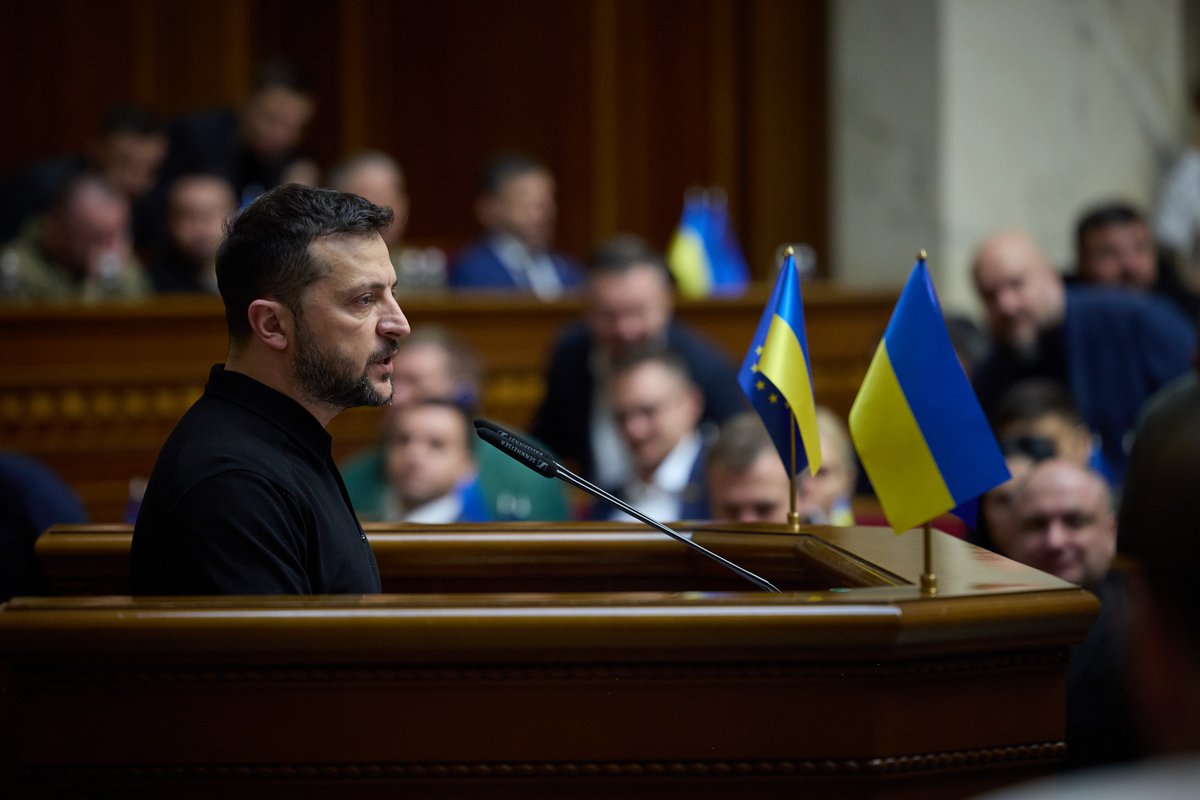Today at the Crimea Platform Summit, I reminded: as some leaders gather at Putin’s summit in Kazan and North Korean soldiers move closer to Ukraine’s front, we know one thing—victory won’t go to the aggressor, but to those who unite nations around human values and the UN Charter. 

The number of national flags in this hall right now is clear evidence that since 2014, Russia has failed in its main goal: Putin has not succeeded in making international crimes a norm for nations.
It was with the occupation of Crimea that Russia’s assault on the system of international law began. But stealing another nation’s land, deporting those who resist, and breaking the lives of an entire nation – everything Russia is doing – will never be accepted by the international community.
For all nations, sovereignty, territorial integrity, and the right to determine one’s future are equally valuable. This is what the UN Charter is based on.
Not on the idea that someone can decide to destroy the life of a neighboring nation or deport it, as Moscow has repeatedly done to the peoples of our region, but on completely different goals and principles. The UN Charter is about real peace, not about normalizing war.
Now, when some state leaders are gathering at Putin’s summit in Kazan, and as military personnel from North Korea may be moving closer to the front in Ukraine under the pretense of “avoiding tensions,” we still know one thing.
The winner will not be the aggressor, not the one who destroys and deports, but the one who unites nations around fundamental human values and the UN Charter.
Almost two years ago, at the G20 summit in Indonesia, I proposed a Peace Formula that could fully restore the effectiveness of the goals and principles of the UN Charter and truly protect lives from aggression.
This is not just about Ukraine. If we succeed in ending this war justly, any other nation against whom similar aggression is planned will be confident that the world has enough strength and unity to defend international law.
That is why I urge all of you to be active and truly unwavering. The aggressor must not benefit from this war. We must endure the battles taking place now on the ground in Ukraine. Likewise, we must endure the battles taking place in the realm of diplomacy.
Russia avoids good faith diplomacy and does not want to return what it has stolen. But we must force them to do so. This means strengthening Ukraine and our common positions.
Ukraine has presented its partners with a Victory Plan, which contains everything necessary to deprive Russia of any alternatives, apart from a just peace.
Ukraine has long deserved geopolitical clarity, and this means an invitation to NATO, which is the right of every democratic nation in Europe. We are all equally interested in ensuring that Putin does not succeed on the battlefield.
It is crucial for everyone that the war ends and does not resume. We must work together for the economic strength of our nations, and we must guarantee reliable security. This is exactly what the Victory Plan provides.
I ask all present to be advocates for these points in their respective capitals and in conversations with partners. When – and if – the Victory Plan is fully implemented, we will see Russia at the Peace Summit. We will see the Peace Formula implemented. We will see the full restoration of the goals and principles of the UN Charter.
Today – on UN Day – it is especially important to say this. To say it when the purpose for which the UN was created is defended not by the UN Security Council and not even by UN officials, but by formats of cooperation like the Crimea Platform or the Peace Summit.
I want to remind the international bureaucracy and political leaders that today is UN Day worldwide, not somewhere in Kazan.
I thank all participants for standing together with us today, for helping to fight for justice for our land and our people – especially for those who need to be freed from Russian occupation, Russian captivity, and Russian deportation.
Among participants today is Nariman Dzhelyal, a representative of the Crimean Tatar people, the indigenous people of Crimea. A person who endured Russian captivity, repression, and imprisonment, and his freedom is proof that unity and determination can make possible even what once seemed impossible.
Nowhere in the world should words like occupation, captivity, or deportation have any power. We must achieve true peace.
• • •
Missing some Tweet in this thread? You can try to
force a refresh









